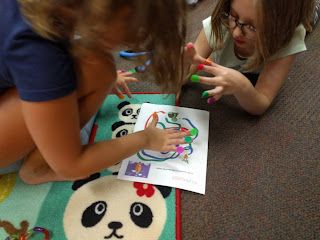Week(s) of Inspirational Math
About a year ago, I read Jo Boaler’s book Mathematical Mindsets, and my understanding of mathematics education was completely transformed. It’s one of those mind-blowing, life-changing professional books. Using combined research of neuroscience, educational studies, and growth mindset, Boaler provides the evidence to support the following tenets for mathematics education:
Anyone can achieve to high levels.
Mistakes grow your brain.
When you believe in yourself, your brain operates differently.
Parents’ beliefs about math affect their children’s achievement.
When teachers believe in their students, the students perform better.
Student assessment ought to align to brain science.
Visual math improves performance.
Speed (often called math fact fluency) is not valuable or important.
Mathematics is about more than computation; it’s a multi-dimensional, open, and creative
subject that is more about patterns than about computation.
This year, we are using a combined approach of some traditional methods, Number Talks, Montessori material integration, and Jo Boaler’s tasks for each of our students’ mathematics learning.
To set the tone of math learning for this year, we are using her Week(s) of Inspirational Math, free lessons with videos on the Youcubed website. Since we have children in grades 2-5, we are using a mixture of the various lessons, in a way that makes sense for us.
Each activity and exploration leads to questions and discovery of math targets through inquiry. As they labored to create a shape of isosceles triangles by matching only sides of the same length, their understanding of the relationships between geometrical shapes solidified at a tactile and problem solving level. They experienced isosceles rather than memorizing it’s definition. When they examined numbers represented by dot patterns, they reignited their number sense; when they endeavored to create 20 numbers using only 4 4’s, they stumbled upon the order of operations as well as exponents. We learned about the Fibonnaci sequence and headed outdoors to find spirals in nature and discovered patterns in Pascal's triangle.
We have been spending our afternoons the last few weeks playing in Jo Boaler’s tasks, and each day, the children say, “It doesn’t seem like we are learning, but then, when I think about it, we are learning a lot.” And when I think about that reflection, I wonder: Are our children telling us, “We don’t expect learning to feel like engagement”?






Comments
Post a Comment